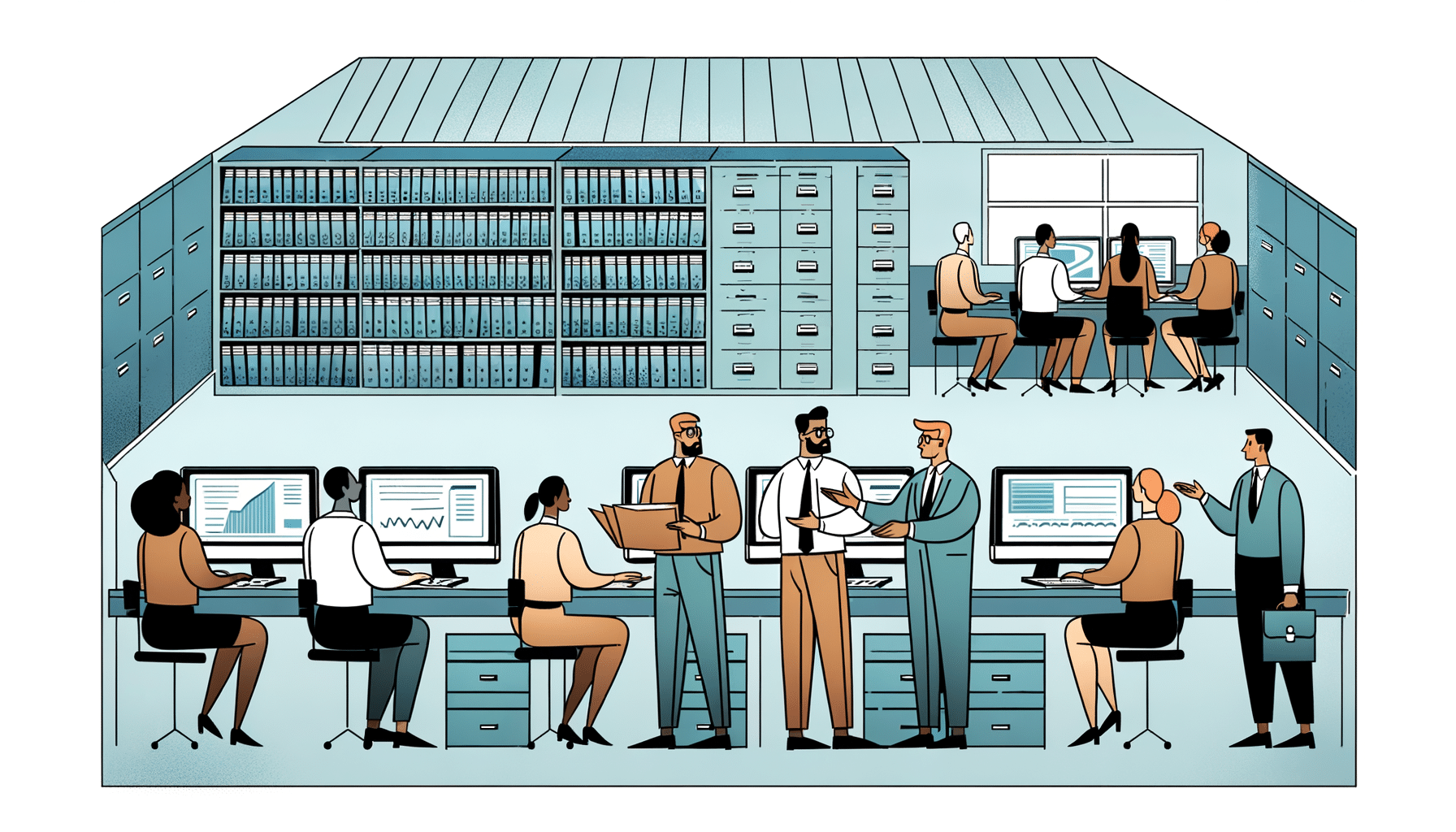- Data Synchronization
- November 16, 2024
AI in Employment Records Management

Revolutionizing Employment Records Management: The AI-Powered Future
In today’s fast-paced world, efficiency and accuracy reign supreme. As an advocate for leveraging technology to streamline business processes, I’ve made it my mission to transform how organizations handle their records. Here’s how integrating AI into employment records management can dramatically enhance HR operations.
The Current Landscape of Employment Records Management
Managing employment records is a critical aspect of Human Resources, yet it’s often bogged down by inefficiencies and errors. Traditional methods involve extensive manual work—sorting, categorizing, retrieving, and auditing a plethora of documents that are core to any organization’s function. The perils of maintaining physical records include misplacement, data inconsistency, and a lag in updating files, all of which can have ripple effects on compliance and efficiency.
With these challenges in mind, imagine the potential of an AI system that automates these processes. By re-envisioning records management, we’re not just keeping pace with digital evolution; we’re fundamentally transforming how HR departments function.
Unleashing AI: The Game-Changer for Employment Records
Embracing AI in employment records management opens doors to unparalleled efficiency. Here’s how AI brings tangible benefits to this crucial HR function:
1. Automated Categorization: With AI, employment records are automatically sorted and tagged, enabling HR professionals to effortlessly access them with natural language queries. This eliminates the endless hours spent rifling through stacks of paper or countless digital folders.
2. Error Mitigation: AI reduces human error by ensuring data accuracy during entry and processing stages. This is achieved through intelligent checks and balances that flag discrepancies for review before they escalate into bigger issues.
3. Enhanced Data Security: AI bolsters security protocols, making sure that only authorized personnel access sensitive information. It provides real-time activity tracking and automated alerts for suspicious activities, safeguarding against data breaches.
4. Compliance Management: AI transforms adherence to industry regulations into a seamless, automated process. Be it GDPR, HIPAA, or SOX, AI optimizes compliance workflows by continuously monitoring policy changes and ensuring updated practices across the board.
The Impact of Automation on HR Teams
While some may fear that automation might render human roles obsolete, the reality is quite the opposite. Automating employment records management allows HR teams to refocus their efforts on strategic initiatives. Unburdened by administrative work, HR professionals can concentrate on talent development, employee engagement, and driving organizational goals.
In my journey with RecordsKeeper.AI, the feedback I’ve received points to increased job satisfaction as HR roles transition from administrative tasks to more meaningful interactions with the workforce. Automation becomes an enabler, propelling HR teams to the forefront of organizational growth.
Implementation Insights: Seamlessly Integrating AI
Transitioning to AI-powered employment records management need not be a daunting task. Here are some insights based on my experiences:
Looking Forward: The Strategic Edge
As the advent of technology continues to redefine professional landscapes, embracing AI in employment records management offers a strategic edge. The efficiency and accuracy it ushers in are essential to staying competitive. With AI, employment records management transcends its traditional role, becoming a pivotal driver in the broader strategy of human resource management.
In conclusion, integrating AI is not just about mitigating existing challenges; it’s about unlocking new potential for growth and innovation in HR. As I look forward to what lies ahead, I invite you to explore this journey with me and consider how AI could redefine your organization’s HR operations. After all, the future of records management is here—and it’s smarter than ever.
Toshendra Sharma is the visionary founder and CEO of RecordsKeeper.AI, spearheading the fusion of AI and blockchain to redefine enterprise record management. With a groundbreaking approach to solving complex business challenges, Toshendra combines deep expertise in blockchain and artificial intelligence with an acute understanding of enterprise compliance and security needs.
Related Posts

Managing Record Access After Staff Changes
Updating record access when employees leave or change roles.
- December 19, 2024

Record Management for Part-Time Staff
Training and monitoring part-time staff record handling.
- December 13, 2024
Archives
- December 2024
- November 2024
- October 2024
- September 2024
- August 2024
- July 2024
- June 2024
- May 2024
- April 2024
- March 2024
- February 2024
- January 2024
- December 2023
- November 2023
- October 2023
- September 2023
- August 2023
- July 2023
- June 2023
- May 2023
- April 2023
- March 2023
- February 2023
- January 2023
- December 2022
- November 2022
- October 2022
- September 2022
- March 2019
Want to get more content like this?
Signup to directly get this type of content to your inbox!!
Latest Post
Organizing External Auditor Access
- December 22, 2024
Document Control in Manufacturing Plants
- December 21, 2024
Handling Rush Financial Report Requests
- December 20, 2024
Managing Record Access After Staff Changes
- December 19, 2024





